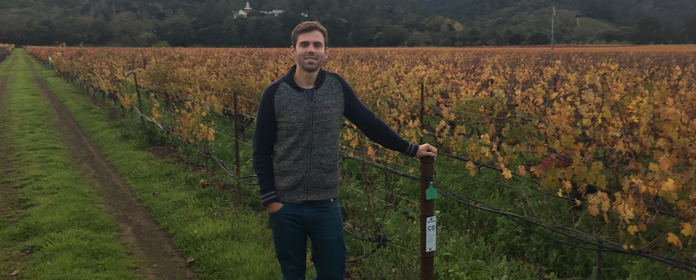Achieving the dream of doing research in California
Johann Martinez Lüscher is the last award extraordinary doctoral program in Biology and Environment.

PHOTO: Courtesy
Johann Martínez Lüscher (Biology 07, PhD 14) has been one of the three winners of the award extraordinary award of doctorate of the School of Sciences. In his case, in the Biology and Environment Program, thanks to the study on the effects of UV-B radiation on the tempranillo variety and under climate change conditions.
Now, two years after the defense of his thesis , he has finally been able to fulfill his dream: to work in California and in the topic that he is passionate about: the vineyard.
- How do you appreciate the recognition received for your work on the Biology and Environment?
I was very happy for the extraordinary award . I am sure there were very good thesis to choose from. This credit also goes to my department, Environmental Biology, and to my directors of thesis . The School never lacked means and, above all, support and good ideas that enriched the project.
What was the focus of your doctorate?
My thesis studied the effect of factors typically linked to climate change - i.e. high temperature, CO2, water scarcity and solar radiation - on the physiological aspects of the grapevine plant and on the very composition of its fruit: grapes.
- How do you value the training received in the School of Sciences at the time of orienting your professional future?
In my opinion, as you specialize the career guidance is, more and more, the responsibility of each one of us. In this sense, we specialize so much that practically only we know what employment opportunities opens up after completing the doctorate.
Of course, from the School financial aid was very active in obtaining the accreditations of the National Agency for Assessment of Quality and Accreditation. Moreover, in my case, my directors encouraged me from the beginning to disseminate my work. Also, of course, to publish the results in congresses and to carry out stays and workshops at international level. result This perspective has been decisive for my degree program. In fact, before finishing thesis I did an interview for work for a multinational fruit company.
- What is, for you, the most positive and the hardest thing about starting a degree program in the field of research?
To be honest, the best thing about the profession of researcher is that it allows you to make progress on knowledge, to do your bit for knowledge of another topic. On the other hand, the hardest thing is, perhaps, the uncertainty of the day to day, of not being very sure that an experiment will give the expected result ... That is why it is core topic to have people by your side who support you.
- What project are you working on now?
I got my first postdoc a week after my thesis defense. I did it in England, where I worked at East Malling Research (EMR), a historical center. There I was studying the possibilities of introducing new crops in the UK in relation to climate change.
But I always wanted to go to California, and last June I realized my dream. I am now work at department of Viticulture and Enology at the University of California, Davis. My job is to manage on a daily basis the laboratory at the university's own experiment station in Napa Valley. From there we participate in precision viticulture projects, conduct trials with new growing techniques, and research the effects of climate change on grape and wine quality.
